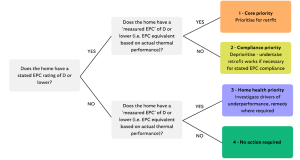Smart Retrofit: Using Measured Data to Accelerate a Just Transition to Net Zero
Across the UK, the social housing sector faces a huge challenge: how to retrofit homes at scale to improve energy efficiency while keeping costs manageable and ensuring residents live in safe, comfortable homes. The recent introduction of Awaab’s Law now also places a legal requirement on social landlords to act promptly on issues of damp and mould.
New technology is beginning to change what’s possible. Smart retrofit solutions such as sensors, digital twins and intelligent measured performance can now give landlords a real-time picture of how their buildings actually perform, both in terms of energy efficiency and its impact on health. Our recent research, conducted in collaboration with partners across housing (Bromford), finance (Lloyds), technology (Senze), and academia (Birmingham City University), set out to answer one central question:
Can intelligent measurement technology help housing providers make smarter, more targeted retrofit decisions, ultimately improving outcomes for residents and reducing costs?
What We Found
Intelligent Measured Data. Smarter Retrofit. Better Outcomes. A study of how innovation in property technology can deliver better outcomes in social housing.
The pilot installed smart sensors in 121 homes to collect live data on a range of factors including temperature, humidity, energy use and heat loss to build up an accurate picture of thermal performance. The data revealed that measured building performance often differs greatly from what Energy Performance Certificate (EPC) ratings suggest. Some homes perform much better than expected, while others fall far short.
This matters because investment decisions are often based on the modelled data that underpin EPCs. By comparing measured and modelled performance, we identified clear groups that can guide smarter decision making. To make sense of the results, we grouped the homes into four categories by comparing their measured and modelled EPC ratings against the EPC C threshold, as shown below.
Figure 1: Measured vs Modelled EPC Performance
Figure 2: Decision Tree

Why Smart Retrofit Matters
Environmental Impact
Smarter data can help landlords target carbon reduction more effectively, ensuring measures like insulation and heat pumps are installed where they’re genuinely needed and appropriately sized. This can reduce emissions faster and make public and private investment go further.
Economic Efficiency
By eliminating unnecessary works and improving procurement targeting, the technology could deliver significant cost savings – a crucial consideration given the scale of retrofit investment required nationwide and the limited balance sheet capacity of many social landlords.
Social Outcomes
Perhaps most importantly, measured data can be used to improve resident wellbeing, identifying homes at risk of cold, damp, or mould, and ensuring support reaches those who need it most. This has direct implications for compliance with new legislation such as Awaab’s Law, as well as broader efforts to tackle fuel poverty.
Looking Ahead: From Pilot to Proof of Impact
While this was a small pilot, the findings point toward a powerful opportunity. Intelligent measurement technology offers a low-risk, agile pathway to scaling smart retrofits, enabling continuous learning about what works, for whom, and at what cost.
But technology alone isn’t enough. Real impact will depend on embedding accountability and evidence into future programmes of investment. To support this, we developed a Theory of Change and Impact Assessment Framework that can be used to track and verify outcomes, including environmental, social, and economic effects, as this approach is scaled.
Figure 3: Theory of Change Model
A Call to Action: Building an Evidence Base for Smart Retrofit
This pilot adds to an emerging body of evidence showing that measured, data-led retrofit can make decarbonisation smarter, faster and fairer. But to unlock its full potential, we need to go further:
- Expand pilots across more housing providers and geographies to build a robust national dataset.
- Integrate measurement technologies into retrofit funding and policy frameworks.
- Share findings openly across the sector to accelerate adoption and standardisation.
- Invest in impact evaluation so that the benefits for residents, landlords, and the environment are fully understood and evidenced.
Helping Housing Associations to Deliver Positive Outcomes
At The Good Economy, our Impact Services team is ready to support housing associations and sector partners on this journey. Drawing on the Theory of Change and Impact Assessment Plan developed for the Lloyds pilot study, we can help you:
- Assess the real-world impact delivered by retrofit programmes using intelligent measured technology.
- Understand and report on the actual environmental, social, and economic outcomes achieved.
- Provide independent, expert scrutiny by bringing an external, evidence-based perspective from the organisation that helped develop this impact framework.
By partnering with The Good Economy, housing associations can ensure that their investments in smart, data-driven retrofit approaches deliver credible, measurable improvements for residents and contribute meaningfully to the UK’s journey to net zero.
The retrofit challenge is vast, but so is the opportunity. With collaboration, evidence, and accountability, we can make retrofit not only smarter and more efficient, but genuinely transformative for people and places.
In 2020, The Good Economy facilitated the development of the Sustainability Reporting Standard for Social Housing through a collaborative, participatory approach bringing together participants from the social housing and financial sectors. Today, the SRS is recognised as a leading voluntary ESG sector standard and TGE remains involved as the Secretariat of Sustainability for Housing.
Find Out More
To read the report in full, please click here
If you missed the launch event, you can watch Ben Rosoman’s presentation here
Get in touch to learn more about how TGE could support your organisation
Related Articles
Funding Affordable Homes 8th Annual Impact Report
22 December 2023
Culture as a Catalyst for Community Growth and Cohesion
30 September 2025
Local Growth Plans for The Good Economy
23 September 2025












